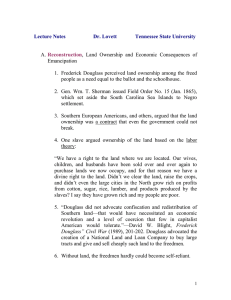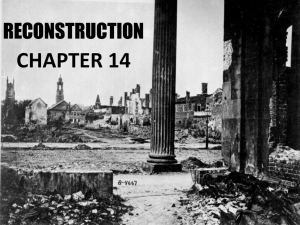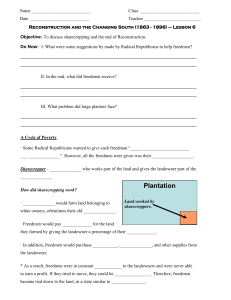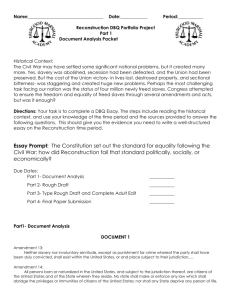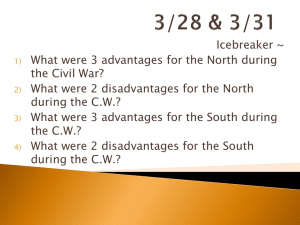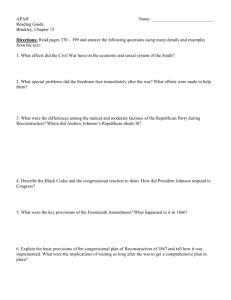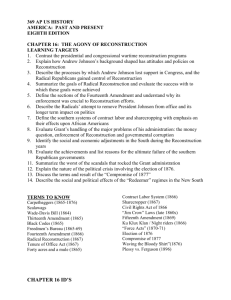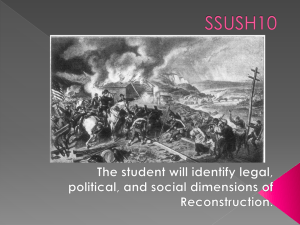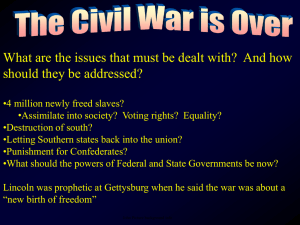Reconstruction Timeline (quotes, cartoons, etc.)
advertisement
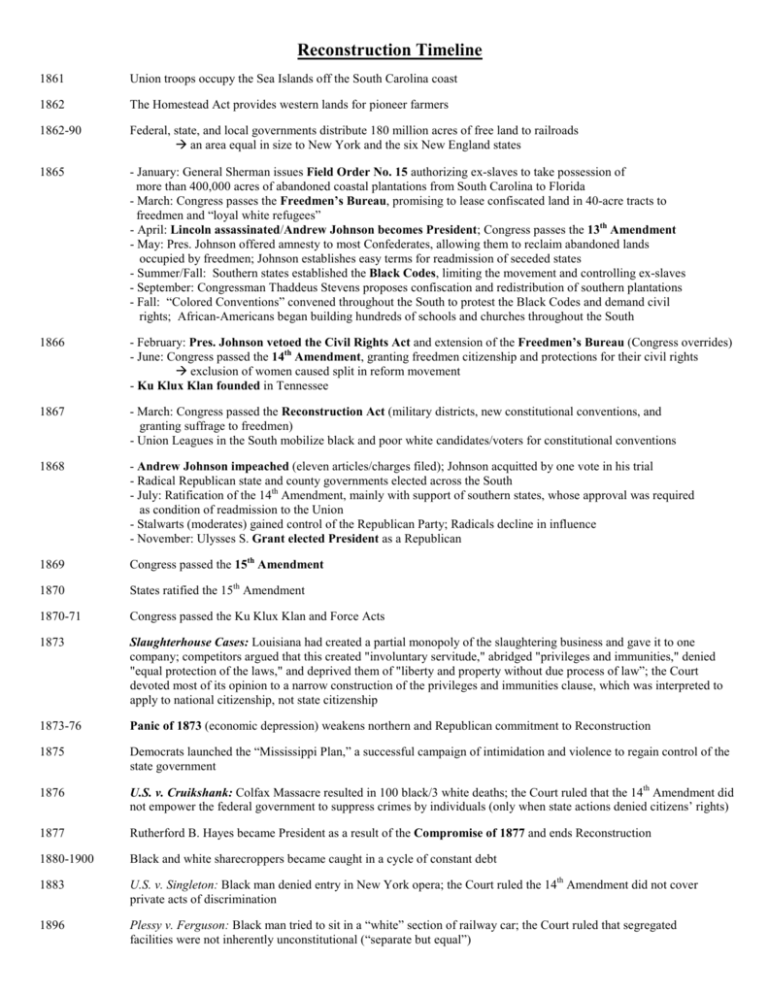
Reconstruction Timeline 1861 Union troops occupy the Sea Islands off the South Carolina coast 1862 The Homestead Act provides western lands for pioneer farmers 1862-90 Federal, state, and local governments distribute 180 million acres of free land to railroads an area equal in size to New York and the six New England states 1865 - January: General Sherman issues Field Order No. 15 authorizing ex-slaves to take possession of more than 400,000 acres of abandoned coastal plantations from South Carolina to Florida - March: Congress passes the Freedmen’s Bureau, promising to lease confiscated land in 40-acre tracts to freedmen and “loyal white refugees” - April: Lincoln assassinated/Andrew Johnson becomes President; Congress passes the 13th Amendment - May: Pres. Johnson offered amnesty to most Confederates, allowing them to reclaim abandoned lands occupied by freedmen; Johnson establishes easy terms for readmission of seceded states - Summer/Fall: Southern states established the Black Codes, limiting the movement and controlling ex-slaves - September: Congressman Thaddeus Stevens proposes confiscation and redistribution of southern plantations - Fall: “Colored Conventions” convened throughout the South to protest the Black Codes and demand civil rights; African-Americans began building hundreds of schools and churches throughout the South 1866 - February: Pres. Johnson vetoed the Civil Rights Act and extension of the Freedmen’s Bureau (Congress overrides) - June: Congress passed the 14th Amendment, granting freedmen citizenship and protections for their civil rights exclusion of women caused split in reform movement - Ku Klux Klan founded in Tennessee 1867 - March: Congress passed the Reconstruction Act (military districts, new constitutional conventions, and granting suffrage to freedmen) - Union Leagues in the South mobilize black and poor white candidates/voters for constitutional conventions 1868 - Andrew Johnson impeached (eleven articles/charges filed); Johnson acquitted by one vote in his trial - Radical Republican state and county governments elected across the South - July: Ratification of the 14th Amendment, mainly with support of southern states, whose approval was required as condition of readmission to the Union - Stalwarts (moderates) gained control of the Republican Party; Radicals decline in influence - November: Ulysses S. Grant elected President as a Republican 1869 Congress passed the 15th Amendment 1870 States ratified the 15th Amendment 1870-71 Congress passed the Ku Klux Klan and Force Acts 1873 Slaughterhouse Cases: Louisiana had created a partial monopoly of the slaughtering business and gave it to one company; competitors argued that this created "involuntary servitude," abridged "privileges and immunities," denied "equal protection of the laws," and deprived them of "liberty and property without due process of law”; the Court devoted most of its opinion to a narrow construction of the privileges and immunities clause, which was interpreted to apply to national citizenship, not state citizenship 1873-76 Panic of 1873 (economic depression) weakens northern and Republican commitment to Reconstruction 1875 Democrats launched the “Mississippi Plan,” a successful campaign of intimidation and violence to regain control of the state government 1876 U.S. v. Cruikshank: Colfax Massacre resulted in 100 black/3 white deaths; the Court ruled that the 14th Amendment did not empower the federal government to suppress crimes by individuals (only when state actions denied citizens’ rights) 1877 Rutherford B. Hayes became President as a result of the Compromise of 1877 and ends Reconstruction 1880-1900 Black and white sharecroppers became caught in a cycle of constant debt 1883 U.S. v. Singleton: Black man denied entry in New York opera; the Court ruled the 14th Amendment did not cover private acts of discrimination 1896 Plessy v. Ferguson: Black man tried to sit in a “white” section of railway car; the Court ruled that segregated facilities were not inherently unconstitutional (“separate but equal”) I go to some churches, and I see all the folks sitting quiet and still like they don't know what the Holy Spirit is. But I find in my Bible, that when a man or a woman gets full of the Holy Spirit, if they should hold their peace, the stones would cry out; and if the power of God can make the stones cry out, how can it help making us poor creatures cry out, who feel to praise Him for His mercy. Not make noise! Why we make a noise about everything else; but they tell us we must not make noise to praise the Lord. I don't want such religion as that. I want to go to Heaven in the good old way. And my brothers and sisters, I want you all to pray for me, that when I get to Heaven I won't never come back again. --Comments made by A FREEDWOMAN at a religious meeting, 1865, as reported by northern white visitors ... [T]hey broke into our well furnished residences on each plantadon and stole or destroyed everything therein. Nor was there a solitary instance in either plantation of any one of our Negroes presenting for us a single thing whatever.... A negro woman [Peggy] seized as part of the spoils my wife's large and handsome mahogany bedstead and mattress and arranged it in her own Negro house on which she slept for some time. Frederick [the driver] was the ringleader [at the Marshland plantation].... He encouraged all the Negroes to believe that the Farm, and every thing on it, now since emancipation, belonged solely to them, and that their former owners had now no rights or control there whatever. --South Carolina planter CHARLES MANIGAULT, 1865 We has a right to the land where we are located. For why? I tell you. Our wives, our children, our husbands, have been sold over and over again to purchase the lands we now locate upon; for that reason we have a divine right to the land.... And then didn't we clear the land and raise the crops of corn, of cotton, of tobacco, of rice, of sugar, of everything? And then didn't... large cities in the North grow up on the cotton and the sugars and the rice that we made!... I say they have grown rich, and my people are poor. -- BAYLEY WYAT, an ex-slave protesting eviction of blacks from confiscated plantations in Virginia, 1866 [Land confiscation] is a question not of humanity, not of loyalty, but of fundamental relation of industry to capital; and sooner or later, if begun at the South, it will find its way into the cities of the North.... An attempt to justify the confiscation of Southern land under the pretense of doing justice to the freedmen, strikes at the root of property rights in both sections. It concerns Massachusetts as much as Mississippi. --New York Times, July 9, 1867 I take the liberty of writing to you a few facts that have come under my observation respecting the freedmen. … The enemy of emancipation cries that negroes will not work, that the government will have to support them, or they will become pests to the country… Any one who has been where he can observe the working of emancipation can see the fallacy of such cant [false, insincere language]. Through the parishes where I have been I think I never saw the [black] laboring class more industrious. Many seem to vie one with each other in making a living, and saving something for a future day…. Those who feel so badly because the Government feeds a few negroes should be with me on ration day and see their white brethren and sisters, those who for the last four years have been trying to destroy the nation, come for their food that the Government has to give to save them from starving… -- CORPORAL RICHARD T. HENRY writing from Donaldson, Louisiana, 1866 It is surprising to see the amount of suffering which many of the people endure for the sake of sending their children to school. Men get very low wages here.. and a great many cannot get work at all. The women take in sewing and washing, go out by day to scour, etc. There is one woman who supports three children and keeps them at school; she says, "I don't care how hard I has to work, if I can only send Sally and the boys to school looking respectable." Many of the girls have but one decent dress; it gets washed and ironed on Saturday, and then it is worn until the next Saturday.... One may go into their cabins on cold, windy days, and see the daylight between every two boards, or feel the rain dropping through the roof; but a word of complaint is rarely heard. They are anxious to have their children "get on in their books" and do not seem to feel impatient if they lack comforts themselves. A pile of books is seen in almost every cabin, though there be no furniture except a poor bed, a table and two or three broken chairs. --MISS M. A. PARKER, the American Freedmen, April 1869 [A] case of some significance that came before me was that of a white man that I knew unfavorably and well. He had cursed, abused, and threatened the life of an inoffensive old colored man on account of a misunderstanding over a small business transaction. Upon the complaint of the colored man, a warrant was issued for the arrest of the party against whom the complaint was made. When he was brought before the court and the charges had been read to him and he w asked whether or not he suns guilty as charged, he seemed to be somewhat surprised. "Why," he remarked, "do you mean to tell me that it is a crime for a white man to curse a nigger? "Yes," the court replied. "It is a crime for a white man to curse a Negro as it is for a Negro to curse a white man." "Well," he exclaimed, "that's news to me. You certainly must be mistaken. If there is such a law, I never heard of it." The court then handed him the code and told him where he could find the section bearing upon the point at issue and requested him to read it for himself, which he did. When he had finished, he exclaimed in a somewhat subdued tone: "Well, I'll be damned." The court then admonished him that if that remark should be repeated, he would be committed to the county jail for contempt of court. He quickly apologized and assured the court that no disrespect was intended. He said that he could not deny having used the language set forth in the affidavit, but he hoped the court would not be severe because he did not know and did not believe that in using that language he was violating any law. Since it was his first offense, he was let off with a fine of five dollars and costs which he promptly paid. It was the first and only time he was brought before me. --The Autobiography of JOHN ROY LYNCH, edited by John Hope Franklin, 1970 You say you have emancipated us. You have; and I thank you for it. But what is your emancipation? When the Israelites were emancipated they were told to go and borrow of their neighbors—borrow their coin, borrow their jewels, load themselves down with the means of subsistence; after, they should go free in the land which the Lord God gave them. When the Russian serfs had their chains broken and given their liberty, the government of Russia—aye, the despotic government of Russia—gave to those poor emancipated serfs a few acres of land on which they could live and earn their bread. But when You turned us loose, you gave us no acres. You turned us loose to the sky, to the storm, to the whirlwind, and, worst, of all you turned us loose to the wrath of our infuriated masters. -- FREDERICK DOUGLASS, summing up the failure of Reconstruction, 1876 “This is a White Man’s Government” – Harper’s Weekly, 1868 “Colored Rule in Reconstructed State” – Harper’s Weekly, 1874 “He Wants a Change Too” – Harper’s Weekly, 1876 Democratic Broadside – Pennsylvania’s campaign of 1866 Klan warning: a prediction in the event of a Democratic victory in 1868 presidential election – Tuscaloosa Independent Monitor, 1868 “Worse Than Slavery” -- Thomas Nast, 1870 “The Fifteenth Amendment Illustrated” -- A support for woman’s suffrage, at the expense of African Americans, Chinese, and illiterate immigrants, in the St. Louis The Star Chamber, 1870
